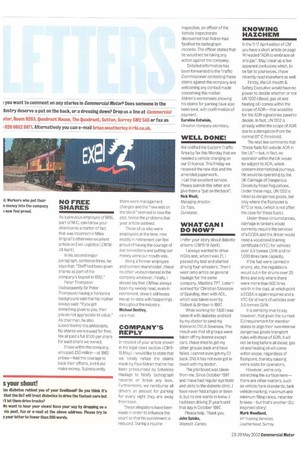KNOWING HAICHEM
Page 24

If you've noticed an error in this article please click here to report it so we can fix it.
In the 11-17 April edition of CM you have a short article on page 14 headed "ADR to embrace oil and gas". May I clear up a few apparent confusions which, to be fair to yourselves, I have recently read elsewhere as well.
Firstly, the UK Health & Safety Executive would have no power to decide whether or not UN 1202 (diesel, gas oil and heating oil) comes within the scope of ADR—that would be for the ADR signatories panel to decide. In fact, UN 1202 is already within the scope of ADR due to a derogation from the normal 61° C threshold.
The next line comments that "these fuels fail outside ADR in the UK"—but, in fact, no operator within the UK would be subject to ADR, which concern international journeys. He would be operating by the UK Carriage of Dangerous Goods by Road Regulations. Under these regs, UN 1202 is listed as dangerous goods, but only where the flashpoint is 61°C or less, (which is not often the case for these fuels).
Under these circumstances, carriage in tankers would currently require the services of a DGSA and the driver would need a vocational training certificate (VIC) for vehicles over 3.5-tonnes GVW and/or 1,000 litres tank capacity.
If the fuel were carried in drums, etc, the regulations would cut in for drums over 25 litres and only where there were more than 500 litres worth in the load, at which point a DGSA is again required and a VTC for drivers of vehicles over 3.5-tonnes GVW, It is certainly true to say however, that given the current EU requirement for member states to align their own internal dangerous goods transport rules with those of ADR, it will not be long before all diesel, gas oil and heating oil will come within scope, regardless of flashpoint, thereby causing extra costs for operators.
However, we're only scratching the surface here— there are other matters, such as vehicle/tank standards, tank vehicle marking, maximum and minimum filling ratios, retarder brakes—but that's another (EU inspired) storyl Mark Woodland, EP TrainiPg Services, Leatherhead, Surrey.




















































































































































